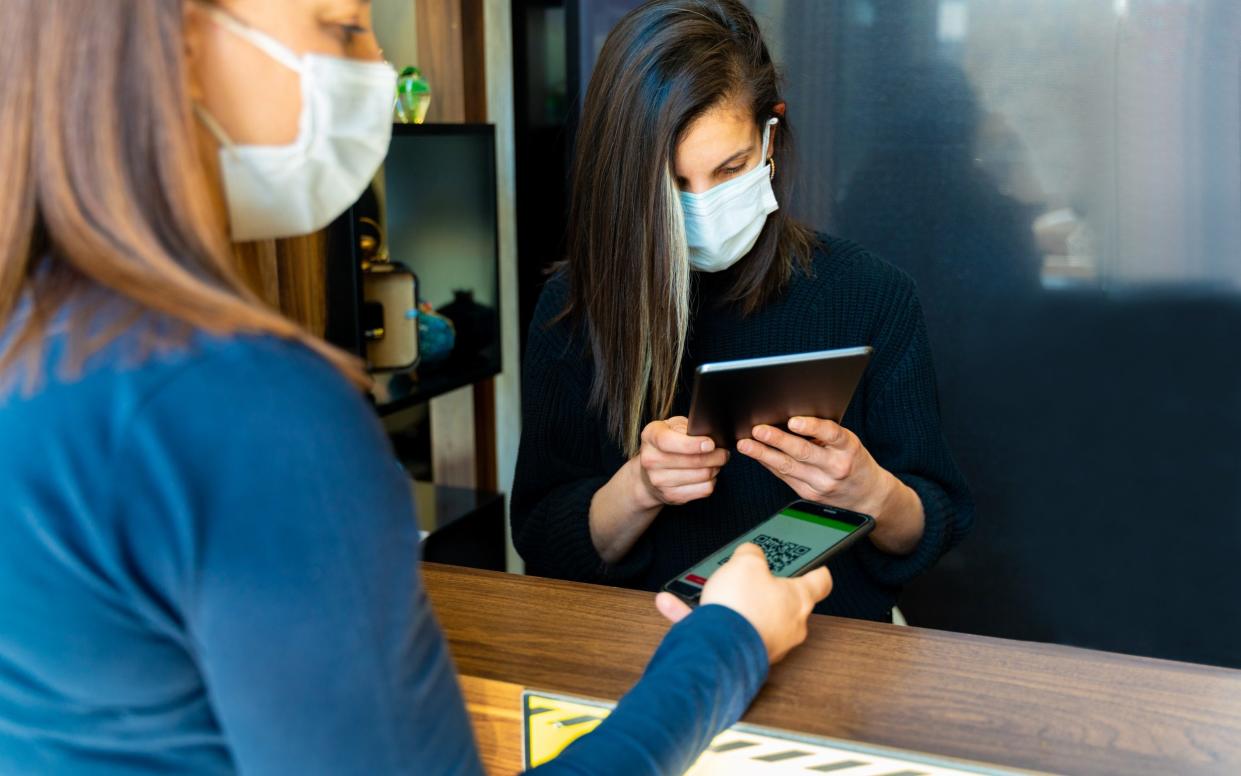The flaw in the NHS app that could still ruin your holiday

The other day somebody approached me with a travel dilemma so illogical, so tangly that I could not believe it was true. But the loophole exists, and if you are not privy to it, it could ruin your next holiday.
Here’s the scenario. Having tested positive for Covid-19 by lateral flow, many people will opt to take a confirmatory NHS PCR test (though it is no longer mandatory to do so). If that result comes back as positive, the NHS app automatically freezes your digital Covid Pass, making it impossible to download or show your vaccination status on the app. The Covid Pass will also be disabled if you register your positive lateral flow result online.
This QR code, as you will be well aware, is required for entry to many destinations, and must be presented to enter indoor venues in countries across the EU including France, Greece and Italy.
But here’s the snag. Even after taking consecutive negative lateral flow tests on days five and six, and therefore lawfully exiting self isolation in the UK, your Covid Pass will remain frozen. In total, it will be unavailable for a full 10 days from the moment you test positive by PCR or register a positive lateral flow result.
There are layers to how absurd this is. The first: if you can leave isolation on day six after first showing symptoms of Covid, why is your Covid Pass disabled for a full 10 days? It suggests you are now non-contagious enough to say, hug a relative or go on the Underground, but still too risky to travel abroad or attend an event which requests a Covid pass (as private venues are entitled to do, even after Plan B measures have been dropped).
The second absurdity is: your self-isolation period actually begins from the moment you first detect symptoms, not from the moment you receive a positive test result. This means if you detect symptoms first thing on February 1, and are positive, your isolation can end as early as February 6 if you take negative lateral flow tests on days five and six.
But your Covid Pass could continue to be disabled for days, or as long as a full week, after you leave isolation. This is because, even if you act as fast as you can to get a confirmatory PCR test after testing positive by lateral flow, and the NHS delivers and processes your postal PCR test at maximum speed, the very earliest you will receive your positive result is after 48 hours. In our scenario, this means your Covid Pass will automatically deactivate on February 3 (earliest) and will only reactivate after 10 full days, on February 13. So if you catch Covid, take a PCR test and have a holiday booked in the fortnight that follows, you could be in a pickle. But there are solutions.
Nowhere does the Government say it is against the law to travel overseas for a set number of days after exiting isolation; rather, this quirk in the NHS app feels like a technical hangover from the days when isolation was a mandatory 10 days, which they have not got round to updating (you may remember, it also took weeks for the NHS app to start showing boosters). As such, there are some simple solutions to avoid this 'computer says no' scenario without breaking any rules.
If you do wish to take a confirmatory PCR test, or if you register your lateral flow result online, one solution is to download your NHS Pass beforehand. This way, even if your pass is disabled on the app, you will have a PDF copy of your full course of vaccination which can be used to travel. A screenshot would also do the job.
A possible solution is to request your Covid Pass by letter. You can do this on nhs.uk or by calling 119. However, the letter could take up to seven days to arrive, which may be too late by the time you’ve realised your digital Covid Pass has been paused. Note, also, that your letter will only be valid for 30 days.
This workaround is destination dependent, but if your Covid Pass is disabled you may be able to pay for a private PCR test to enter a country without needing to show a vaccine certificate – in Egypt and Switzerland, for example. However, some people continue to test positive by PCR for 30 days after contracting Covid-19, so this route may not work for you either. Many destinations across Europe will also require a vaccine certificate to enter venues domestically, which could prove problematic.
A better solution, of course, would be for the Government to shorten the pass pausing period to a more sensible time frame: maybe introducing an ‘I am now negative and no longer isolating’ button to reactivate the pass from day six onwards, for example.
Or better still would be that the Government starts treating the population like adults and stops pausing our Covid Passes (whether we should have Covid passes at all is a discussion for another day). The route out of this pandemic is surely going to be about personal responsibility and trust, not about ‘freezing’ liberties as basic as to travel overseas.
Reader Service: Are you wondering what you need to do before flying? Or when you need to buy travel insurance? Learn more about the Telegraph Media Group Travel Insurance service and find answers to your question

